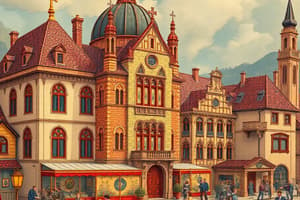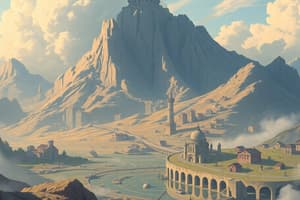Podcast
Questions and Answers
Which branch of geography focuses on natural features such as landforms and ecosystems?
Which branch of geography focuses on natural features such as landforms and ecosystems?
- Cultural Geography
- Human Geography
- Physical Geography (correct)
- Environmental Geography
What is a primary source in historical studies?
What is a primary source in historical studies?
- A textbook summarizing events
- A documentary about a historical event
- A collection of photographs from an era (correct)
- A biography written about a historical figure
Which term describes the set of principles that prevents any one branch of government from becoming too powerful?
Which term describes the set of principles that prevents any one branch of government from becoming too powerful?
- Checks and Balances (correct)
- Federalism
- Civil Liberties
- Separation of Powers
What concept refers to the understanding of spatial relationships through various types of maps?
What concept refers to the understanding of spatial relationships through various types of maps?
What is the main focus of human geography?
What is the main focus of human geography?
Which of the following events is considered a significant historical turning point?
Which of the following events is considered a significant historical turning point?
What is a key aspect of civic engagement?
What is a key aspect of civic engagement?
Which type of government is characterized by a single ruler with absolute power?
Which type of government is characterized by a single ruler with absolute power?
Flashcards are hidden until you start studying
Study Notes
Geography
- Definition: The study of the Earth's landscapes, environments, and the relationships between people and their environments.
- Key Concepts:
- Physical Geography: Examines natural features (landforms, climates, ecosystems).
- Human Geography: Studies human activities and their impact on the environment (population, culture, urban development).
- Map Skills: Understanding different types of maps (political, physical, thematic), reading coordinates, and using scale.
- Regions: Concept of regions (formal, functional, vernacular) and their significance in understanding spatial relationships.
- Environmental Issues: Topics such as climate change, resource depletion, and sustainability.
History
- Definition: The study of past events, societies, and cultures.
- Key Concepts:
- Chronology: Understanding timelines, historical eras (Ancient, Medieval, Modern).
- Significant Events: Notable historical events and their impacts (World Wars, revolutions).
- Historical Sources: Differentiating between primary (original documents, artifacts) and secondary sources (histories, documentaries).
- Cultural Heritage: The role of traditions, customs, and collective memory in shaping societies.
- Causes and Effects: Analyzing the causes of historical events and their longer-term impacts on society.
Civics
- Definition: The study of the rights, responsibilities, and roles of citizenship in a democratic society.
- Key Concepts:
- Citizenship: Understanding what it means to be a citizen (rights, duties, naturalization).
- Government Structure: Knowledge of different forms of government (democracy, monarchy, dictatorship) and branches of government (executive, legislative, judicial).
- Constitution: Importance of constitutions in government, focusing on principles such as separation of powers and checks and balances.
- Voting and Elections: Mechanisms of democratic participation, including the electoral process and significance of voting.
- Civic Engagement: Encouraging active participation in community and political life, understanding advocacy, and public service.
Geography
- Geography is the study of the Earth's landscapes, environments, and the relationship between people and their environment.
- Physical geography examines natural features like landforms, climates, and ecosystems.
- Human geography focuses on human activities and their impact on the environment, including population, culture, and urban development.
- Map skills involve understanding different types of maps (political, physical, thematic), reading coordinates, and using scale.
- Geographic regions (formal, functional, and vernacular) help understand spatial relationships.
- Environmental issues like climate change, resource depletion, and sustainability are crucial topics within geography.
History
- History studies past events, societies, and cultures.
- Chronology involves understanding timelines and historical eras (Ancient, Medieval, Modern).
- Understanding significant historical events and their impact (World Wars, revolutions) is essential.
- Distinguishing between primary sources (original documents, artifacts) and secondary sources (histories, documentaries) is crucial for historical analysis.
- Cultural heritage is shaped by traditions, customs, and collective memory, and plays a significant role in shaping societies.
- Analyzing the causes and effects of historical events helps understand their long-term impacts on society.
Civics
- Civics studies the rights, responsibilities, and roles of citizenship in a democratic society.
- Citizenship involves understanding rights (like freedom of speech, assembly), duties (like paying taxes, voting), and naturalization.
- Different forms of government exist (democracy, monarchy, dictatorship) and understanding these government structures is crucial.
- Constitutions are fundamental documents that outline government structure and principles like separation of powers and checks and balances.
- Voting and elections are the mechanisms of democratic participation, involving electoral processes and the significance of voting.
- Civic engagement involves actively participating in community and political life, understanding advocacy, and public service.
Studying That Suits You
Use AI to generate personalized quizzes and flashcards to suit your learning preferences.




